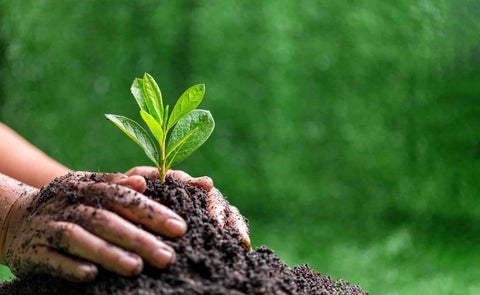
Stress Awareness Month (April 2023): How Connecting with Nature on Earth Day Can Help Reduce Stress

Written By:
Katie Stone - Naturopath
Medical Reviewer:
Dr. Nare Simonyan - PhD Pharmaceutical Science
Edited By:
Kari Asadorian - BSN, RNUpdated On:
June 16, 2025The benefits of nature on mental health
An estimated 10% of the world’s population is affected by a mental health disorder.4 While many of these disorders can be treated with medication, the side effects of drugs has led to a renewed interest in alternative solutions. These include nutritional supplements, meditation, mindfulness exercises, sleep hygiene, physical activity, relaxation techniques, and other healthy habits. One of the most effective is the practice of engaging with the natural environment.
A growing number of studies have shown that spending time in nature can have a positive impact on mental health. Being connected with nature is positively associated with a greater sense of well-being and negatively associated with mental distress. Visiting natural environments can be beneficial in reducing both physical and psychological stress levels, with some research showing that those who immerse themselves in a natural environment report significantly lower levels of stress than those who spend time in more urbanized outdoor or indoor exercise facilities.5
Another study found that frequent visits to green spaces were associated with less frequent use of medications by those living in urban areas - particularly psychotropic, antihypertensive and asthma medications.6
In fact, nature-based health interventions (NBIs) are shown to improve mental health outcomes so effectively, it’s hoped they may help to address the growing demand for less intrusive and more cost-effective treatments.
One systematic analysis reported improvements across all mental health outcomes when engaging with nature7 Depression and anxiety decreased when people engaged with natural outdoor environments.
Studies show that people living in areas with more “green space” have lower mental distress and report a greater sense of wellbeing. Even just visiting green spaces on a regular basis was beneficial.8
In Japan, the practice of ‘forest bathing’ (shinrin-yoku) has been shown to significantly lower cortisol levels, representing an important means of reducing stress.9 Another study found that hiking in the outdoors significantly increased feelings of happiness.10
Considering that many chronic health issues such as coronary disease and obesity are linked to stress, this is an important finding.
How connecting with nature can help reduce stress
Most of us would agree that we feel more relaxed and calm in a natural setting, such as in a forest or at a lake. And there’s plenty of scientific evidence to show that we experience numerous physiological improvements after viewing or immersing ourselves in natural settings.11
Researchers explain that nature provides a multi-sensory experience. Many aspects of our lives are monotonous - which itself can be a source of stress - and the multimodal sensory input from a natural environment can drive positive mental states such as tranquility.12 Psychological connectedness to the natural world, e.g. feeling part of nature or seeing beauty in natural things, is also positively associated with positive well-being.13
Being in nature is shown to trigger beneficial psychological and physiological responses. It can help reduce blood pressure and heart rate, improve concentration, reduce levels of stress hormones, and improve cognitive function.14 One study even found that a short walk along urban roads surrounded by trees significantly reduced nervous tension, anxiety, fatigue, and confusion.15
Two theories have been proposed to explain these results. Attention recovery theory suggests being surrounded by the natural environment allows us to concentrate effortlessly. In other words, being in environments that fascinate us - such as watching a sunset - stimulate our attention involuntarily, allowing directed-attention mechanisms a chance to replenish.16
Stress reduction theory proposes that exposure to nature calls on evolutionary psychological responses of safety and survival, activating our parasympathetic nervous system and promoting recovery from psychophysiological stress.17
Earth Day and environmental stress
In addition to the psychological stress that can contribute to ill health, many of us living in urban areas also face “environmental stress”. Environmental stresses include the production and release of new chemical compounds and large-scale land-use changes resulting directly from human actions.18 Both psychological and environmental stress have been associated with an increased risk of mental and physical health issues, partly due to the way stress can affect nutrition and micronutrient concentrations in the body. For example, both acute and chronic exposure to psychological and environmental stress has been associated with lower magnesium levels and higher output of magnesium in urine.19
Pollution is another form of environmental stress that can be detrimental to human health. Exposure to high levels of air pollution - both short- and long-term - can increase the risk of respiratory infections, heart disease and lung cancer. According to WHO, the most harmful products of pollution are fine PM2.5 particles that penetrate deep into lung passageways. Children, the elderly, and those who are already ill are more susceptible.20
Earth Day aims to raise awareness about protecting the Earth and preserving its natural resources for future generations. By spending time outdoors and connecting with nature more fully, we can understand just how important it is to consider our impact on the environment. In fact, practicing sustainability and “going green” have been shown to have important benefits for our cognitive and emotional health. One study reported that people who engage in physical activity outdoors and have greener households feel less stressed, and have better physical and psychological health.21 Living an eco-friendly lifestyle fosters a deeper connection with nature and stimulates positive mood.
The takeaway
Stress affects a significant proportion of the population and is a leading cause of many chronic health conditions. National Stress Awareness Day is a valuable reminder that effective stress management and regular self-care should be a priority for everyone, especially when it comes to supporting work-life balance and productivity.
Connecting with the natural environment can not only help to reduce stress but provide many other physiological and psychological benefits. Simply being outdoors in a green space can help us relax and enhance our sense of wellbeing.
Earth Day serves as an opportunity for us to realize the importance of nature: not only for future generations, but for our own health and wellbeing. Making a conscious effort to reduce our impact on the environment is beneficial not only for the planet but for our minds.
Going green gives us a sense of purpose in life as we understand the importance of supporting the planet, and the rewards that come with making changes to our environmental footprint.



References
-
Mohd Razali Salleh; "Life event, stress and illness"; The Malaysian journal of medical sciences; 2008 Oct
https://pubmed.ncbi.nlm.nih.gov/22589633/
-
National Institutes of Health | Office of Human Resources
https://hr.nih.gov/working-nih/civil/national-stress-awareness-month
-
Bryan Robinson; "1 Thing You Must Do At Work During National Stress Awareness Month"; Forbes.com; 2023 Apr
https://www.forbes.com/sites/bryanrobinson/2023/04/01/1-thing-you-must-do-at-work-during-national-stress-awareness-month/?sh=2a970e956683
-
Saloni Dattani, Lucas Rodés-Guirao, Hannah Ritchie, Max Roser; "Mental Health"; Published online at OurWorldinData.org; 2023
https://ourworldindata.org/mental-health
-
Alan Ewert, Yun Chang; "Levels of Nature and Stress Response"; Behav. Sci.; 2018
https://www.mdpi.com/2076-328X/8/5/49
-
Anu W Turunen, Jaana Halonen, Kalevi Korpela, Ann Ojala, Tytti Pasanen, Taina Siponen, Pekka Tiittanen, Liisa Tyrväinen, Tarja Yli-Tuomi, Timo Lanki; "Cross-sectional associations of different types of nature exposure with psychotropic, antihypertensive and asthma medication"; 2020−2022
https://oem.bmj.com/content/80/2/111
-
Rachel M Nejade, Daniel Grace, Leigh R Bowman; "What is the impact of nature on human health? A scoping review of the literature"; Journal of global health; 2022 Dec
https://www.ncbi.nlm.nih.gov/pmc/articles/PMC9754067/
-
Mathew P. White, Lewis R. Elliott, James Grellier, Theo Economou, Simon Bell, Gregory N. Bratman, Marta Cirach, Mireia Gascon, Maria L. Lima, Mare Lõhmus, Mark Nieuwenhuijsen, Ann Ojala, Anne Roiko, P. Wesley Schultz, Matilda van den Bosch, Lora E. Fleming; "Associations between green/blue spaces and mental health across 18 countries" Scientific Reports; 2021 Apr
https://www.nature.com/articles/s41598-021-87675-0
-
Michele Antonelli, Grazia Barbieri, Davide Donelli; "Effects of forest bathing (shinrin-yoku) on levels of cortisol as a stress biomarker: a systematic review and meta-analysis"; International journal of biometeorology; 2019 Aug
https://pubmed.ncbi.nlm.nih.gov/31001682
-
Martin Niedermeier, Jürgen Einwanger, Arnulf Hartl, Martin Kopp; "Affective responses in mountain hiking-A randomized crossover trial focusing on differences between indoor and outdoor activity"; PLoS One; 2017 May
https://pubmed.ncbi.nlm.nih.gov/28520774/
-
Rachel M Nejade, Daniel Grace, Leigh R Bowman; "What is the impact of nature on human health? A scoping review of the literature"; Journal of Global Health; 2022 Dec
https://jogh.org/2022/jogh-12-04099
-
M D Hunter, S B Eickhoff, R J Pheasant, M J Douglas, G R Watts, T F D Farrow, D Hyland, J Kang, I D Wilkinson, K V Horoshenkov, P W R Woodruff; "The state of tranquility: subjective perception is shaped by contextual modulation of auditory connectivity"; Neuroimage; 2010 Nov
https://pubmed.ncbi.nlm.nih.gov/20600971/
-
Colin A. Capaldi, Raelyne L. Dopko, John M. Zelenski; "The relationship between nature connectedness and happiness: a meta-analysis"; Frontiers in Psychology; 2014 Sep
https://www.frontiersin.org/articles/10.3389/fpsyg.2014.00976/full
-
Jiaqi Gu, Haixiao Liu, Hong Lu; "Can Even a Small Amount of Greenery Be Helpful in Reducing Stress? A Systematic Review"; International journal of environmental research and public health; 2022 Aug
https://pmc.ncbi.nlm.nih.gov/articles/PMC9408062/
-
Mohamed Elsadek, Binyi Liu, Zefeng Lian, Junfang Xie; "The influence of urban roadside trees and their physical environment on stress relief measures: A field experiment in Shanghai"; Urban Forestry & Urban Greening; 2019 Jun
https://www.sciencedirect.com/science/article/abs/pii/S1618866718306356?via%3Dihub
-
Marc G Berman, Ethan Kross, Katherine M Krpan, Mary K Askren, Aleah Burson, Patricia J Deldin, Stephen Kaplan, Lindsey Sherdell, Ian H Gotlib, John Jonides; "Interacting with Nature Improves Cognition and Affect for Individuals with Depression"; Journal of affective disorders; 2013 Nov
https://www.ncbi.nlm.nih.gov/pmc/articles/PMC3393816/
-
Roger S. Ulrich, Robert F. Simons, Barbara D. Losito, Evelyn Fiorito, Mark A. Miles, Michael Zelson; "Stress recovery during exposure to natural and urban environments"; Journal of Environmental Psychology; 1991 Sep
https://www.sciencedirect.com/science/article/abs/pii/S0272494405801847?via%3Dihub
-
ScienceDirect.com; "Encyclopedia of Biodiversity"; 2013
https://www.sciencedirect.com/referencework/9780123847201/encyclopedia-of-biodiversity
-
Advances in Nutrition; An International Review Journal
https://academic.oup.com/advances/article/11/1/103/5555581
-
World Health Organization
https://www.who.int/news/item/15-11-2019-what-are-health-consequences-of-air-pollution-on-populations
-
Katherine Ka Pik Chang, Frances Kam Yuet Wong, Ka Long Chan, Fiona Wong, Hung Chak Ho, Man Sing Wong, Yuen Shan Ho, John Wai Man Yuen, Judy Yuen-man Siu, Lin Yang; "The Impact of the Environment on the Quality of Life and the Mediating Effects of Sleep and Stress"; International journal of environmental research and public health.: 2020 Nov
https://www.ncbi.nlm.nih.gov/pmc/articles/PMC7698595/

About the Author
Katie is a qualified Naturopath (BNatMed) and freelance writer from New Zealand. She specializes in all things health and wellness, particularly dietary supplements and nutrition. Katie is also a dedicated runner and has completed more half-marathons than she can count!
Related Articles

What is the Best Form of B12 for You?
Written By: Jamie Hope - Methyl-Life® Founder

Like what you read?
Please subscribe to get more content like this sent to your inbox.
Share This Article
Trusted by Experts. Backed by Science.
Trusted professionals crafting original content backed by verified research. Since 2012, Methyl-Life® has been dedicated to providing evidence-based education to help individuals better understand methylation and nutritional wellness.
-

Expert-authored education
Every article and guide is written or reviewed by professionals specializing in methylation science and nutritional biochemistry.
-

Research-verified information
Our content references peer-reviewed studies and verified data, ensuring accuracy, integrity, and real-world relevance.
-

Educational leadership since 2012
A founder-led team collaborating with clinicians, researchers, and health writers to make complex science accessible and actionable.
-

Transparent and trustworthy
All educational materials undergo internal review for scientific accuracy, compliance, and clarity before publication.






